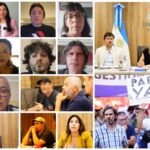
The price of coffee fires and exposes the impact of Trump’s fare on Brazil, aggravating a crisis already fueled by weak harvests and unstable climate
Nothing better symbolizes the American routine than the morning coffee cup. The aroma, the dark color, the first sip – all this is part of a collective ritual, almost sacred, for two thirds of the United States population. But today, this little act of comfort is being transformed into an affordable luxury only to the richest – not by natural economy failures, nor for an uncontrollable climate crisis, but for a deliberate political decision, ideologically loaded and economically foolish: the 50% rates imposed by Donald Trump on Brazilian coffee imports.
This is not a simple commercial adjustment. It is an attack on the daily lives of millions of ordinary Americans, disguised as “national protection.” And it comes with a dangerous logic, typical of the American far-right: the belief that mass suffering is an acceptable price for “economic sovereignty,” even when this sovereignty is illusory and the cost is paid by workers, retirees, parents who choose to pay the electricity bill or keep coffee on the table.
Also read:
The bitter cup of Trump’s tariff policy
American right promises revenge on behalf of Kirk
President of the Supreme Court highlights the Court’s historical mission at the conclusion of the trial
Coffee does not grow in the US – but the ideology of retaliation yes
Brazil produces about one third of Arabica coffee consumed in the United States. Arabica. Premium type, mild flavor, which makes the American morning more than a necessity – something that has become a culture. Vietnam and Colombia try to supply the gap, but their grains are of inferior quality, their limited logistics capabilities, and their harvests are already under climate pressure. When Trump imposed these rates, it was not a negotiation strategy. It was an act of geopolitical revenge, a gesture of brute force against a country that does not threaten the US militarily but challenges its economic rule with its productivity and efficiency.
And what is the result? The price of ground coffee reached $ 8.87 per pound in August – the highest level since 1997. An increase of 21% in one year. This is not normal inflation. It is inflation provoked. And she didn’t come by chance. It has arrived because someone has decided that Brazil should pay for its independence, for its ability to produce something that the US cannot produce – and therefore must be punished.
This is what the far right does: transform interdependence into weakness, and international cooperation into betrayal. While European and Asian leaders seek alliances to face climate change and ruptures in global chains, the extremely widely chosen the path of fantasy self-sufficiency-and economic repression.
The climate crisis is real
Yes, climate change is devastating the crops in southern Brazil, in southern Colombia, in the center of Vietnam. Dried, frost, irregular rainfall – all of this reduced the global offer. But if prices were rising only because of the climate, the market would have responded with increased production in other regions, with investments in resilient agricultural technologies, with coordinated public policies.
What happened, in fact, was exactly the opposite. Instead of cooperating, the US cut off one of the main sources of supply. In July, Brazilian exports to the US fell in half. In August, more than 75%fell. This is not a consequence of the climate crisis. It is a consequence of Donald Trump’s political decision.
And experts warn: stocks that still dampe the impact are running out. The shipments of Santos take up to 20 days to arrive. The roasting takes longer. The transfer to consumers will be slow – but inevitable. And when you arrive, it will be brutal.
Thijs Geijer, Senior Economist of Ing, warns: “It will be necessary to send additional shipments again, but the question is: where will they come from?” The answer is obvious: there is no viable substitute. And if any, it will be more expensive. And more unstable.
Retail trying to hold the price – but cannot do it alone
Kroger, the largest US supermarket chain, says it is absorbing part of the increase. That “occasionally” the tariffs will affect prices. But this is corporate language to say, “We are trying to protect our customers, but we can’t continue that way.”
How can a private company support this sacrifice indefinitely? If the cost of coffee increases 20%, and the average American salary grows less than 3% per year – how to expect retail to continue paying the bill?
This is where the far right shows its radical hypocrisy: while screaming for “less government” and “free market”, it creates artificial distortions that can only be corrected by the state itself-but only if the state is used to protect the interests of the elite.
When the food sector calls for exemptions for coffee – as it did urgently – the White House responds with a preliminary list of “possible exceptions.” A list. Not a decision. A postponement. A political game.
Meanwhile, are American families being required to choose: coffee or bread? Coffee or medicines? Coffee or public transport?
Coffee is a symbol – and the tariff is also a symbol
Coffee is not just a drink. It is a symbol of daily life, routine, simple dignity. This is what keeps the teacher awake, the nurse standing, the application driver driving for hours, the clerk preparing the day. It is an essential good, not luxury. And now, it is being used as a weapon.
The American far-right has a profoundly elitist view of the economy: he believes the world acts as a chess game, where the suffering of working classes is an acceptable movement to defeat a foreign opponent. But Brazil is not an enemy. It is a partner. And coffee is not a strategic defense product – it is a good consumer good.
This rate does not strengthen the US. It weakens the purchasing power of the middle class and the working class. It increases food inflation – which has risen 2.9% in August, the highest rate since January – and transforms a cultural habit into a financial burden. And all this, in the name of a populist narrative that promises to “make America big again,” while making ordinary Americans increasingly poor.
The price of economic ignorance
The far right does not understand economy. Does not understand global chains. It does not understand that US prosperity depends on integration, not the municipality. She thinks that if she blocks Brazilian coffee, the US will become stronger. But what happens is the opposite: the US becomes more vulnerable.
While Brazil invests in sustainable agriculture, climate -resistant cultivation technology, the US refuses to invest in anything other than war, surveillance and rhetorical. While the world seeks multilateral solutions to the food crisis, the US under trickster leadership chooses isolation.
And who pays? The workers. The mothers. The elderly. The students. Those who have no lobby power, but have to drink coffee to work.
The food sector – which includes roasting, supermarket chains and logistics companies – requested exemption. They know there is no competitive American coffee. They know that it is not possible to cultivate high quality Arabica in Texas or California. They know that the solution is to negotiate, not retaliate.
But the far right does not hear. She doesn’t want solutions. She wants symbolic victories. She wants to show that “Trump is still in control,” even when control is illusory.
And that is what makes this policy so dangerous: it is not wrong with incompetence. It is wrong by intention.
Future coffee contracts have already fired. Prices will rise more. In October. In November. Perhaps in December, when families need to buy Christmas gifts and still keep coffee at the table.
And when that happens, the right -wing republicans will say, “It was inflation! It was the Biden government! It was the climate!”
But we know the truth.
We know it was a 50% rate about Brazilian coffee – imposed by a man who never worked on a plantation, never drank a coffee made with grains from Minas Gerais, never felt the weight of an empty cup in the hand of someone who can’t afford it.
We know it was the extreme American right, with its obsession with confrontation, its aversion to cooperation and their contempt for the real life of ordinary people.
It is not enough to complain. We need to demand. Demand that Congress prevent these rates. Demanding the Trade Department recognizes that coffee is not a national security product – it is an essential good. Demand that the president – any president – stop using the Americans pocket as a currency in crazy geopolitical games.
And, above all, we need to denounce this logic: that popular suffering is acceptable if used to “punish” countries that do not bow to American hegemony.
Coffee is not a consumer symbol. It is a symbol of humanity. Of routine. Of dignity. And now, it is being taken hostage by an ideology that hates the world we build together.
If you drink coffee every day – and most Americans drink – then you are being taxed by a policy that does not fit your interest. And you have the right – and the responsibility – to say, Just.
America does not have to be great with the hunger of its own citizens.
America can be large – without taking the coffee from the poor.
With information from Financial Times*
Source: https://www.ocafezinho.com/2025/09/13/americano-ja-sente-saudade-do-cafe-brasileiro/

